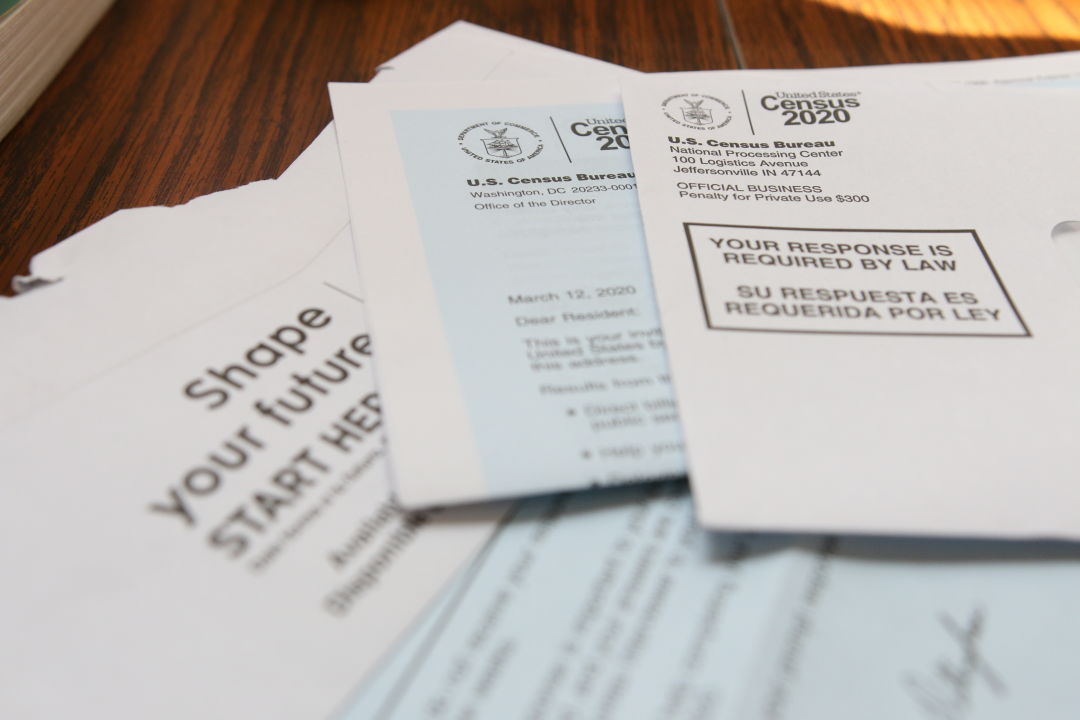The Census Goalposts Keep Moving, Leaving Oregon Organizers Scrambling

Fill out those forms, before it’s too late!
Image: Gabriel Granillo
Trying to collect data from every last citizen is hard enough without factoring in a global pandemic, an intense wildfire season, and frequently changing deadlines. This year’s census takers—in Oregon and everywhere else—are facing an uphill battle, to say the least.
Still, the train keeps moving—that is until Monday, October 5, when field data collection will officially end ... maybe.
That deadline has shifted multiple times this year, thanks to battles with the Trump administration which is angling in federal court to end it even earlier than the planned date of October 31.
The changing deadlines and unpredictable circumstances have left the likelihood of accurate census results in flux, particularly for historically hard-to-count communities—primarily BIPOC communities, areas with large immigrant populations, and rural counties.
“In 2010, there was five area census offices,” says Charles Rynerson, coordinator with Oregon State Data Center at Portland State University. But now because of budget cuts, he says, the Census Bureau has scaled back operations nationwide, leaving just three offices statewide, in Portland, Eugene, and Salem. The census was hurt, too, he says, by the Trump administration’s attempt to insert a citizenship question onto this year’s census form—an effort ultimately blocked by the courts, but the damage was done, particularly among immigrant communities worried that filling out the form could lead to deportation.
That’s where We Count Oregon comes in. We Count Oregon, run by an all-female, Black, Latinx, and Indigenous crew, is a community-led campaign, both public and privately funded, intended to ensure all Oregonians fill out their census form.
“As we move towards the end, most of our push is communication-based,” says Precious Edmonds, the Community Engagement & Partnerships Coordinator for We Count Oregon. “We also have a schedule to make sure people are aware of deadline changes and we have social media to make sure we continue engagement.”
Pressure for accurate results is high, because the census doesn’t only determine the amount of people who live in specific areas—it uses collected data to determine where government funding is spent.
“The census determines the number of US House representatives we have [in Oregon],” Edmonds says. “Oregon has the potential of gaining a new congressional seat ... It’s really crucial that we have an accurate census count.”
Before COVID-19 forced social distancing, Edmonds says, the We Count Oregon campaign had planned “Census Summits,” organized events appealing to the hard-to-count demographics. After the pandemic hit, Edmonds says the campaign had to reevaluate: “[We had to] to figure out how to bring that same essence into that base. So, we partnered with radio stations within a particular demographic, and had people who are community leaders represent us to bring some familiarity in that way.”
Esperanza Tervalon-Garrett, the campaign manager at We Count Oregon, is confident that no matter the date, they will get the job done. “I and my leadership at We Count Oregon made a commitment to empower our communities through this process and we are holding that commitment really seriously. That's not to say that we won't call out the injustice of the interference perpetrated by our federal government during this process,” Tervalon-Garrett says. “But we still have to show up and be counted.”
One thing that We Count Oregon has done to help potential census takers be aware of the coming deadline, was to start a countdown clock. “In September, we started a seven day countdown to the end. We’ve gone from the seven-day countdown to the 33-day countdown,” Tervalon-Garrett says. “That’s something people can follow and participate with on our Instagram page.”
As We Count Oregon faces uncertain deadlines, Tervalon-Garrett and the campaign remain active and upbeat. “We’ve talked to over 200,000 people on the phone. Now a lot of [our push] at this point, is on social media and pushing the idea that it’s not too late (to be) counted,” Tervalon-Garrett says. “Your count is more important than ever.”




